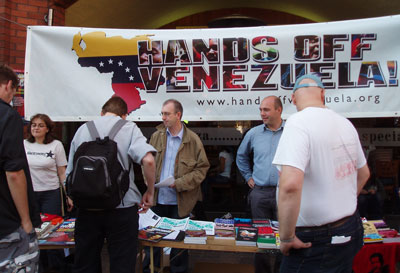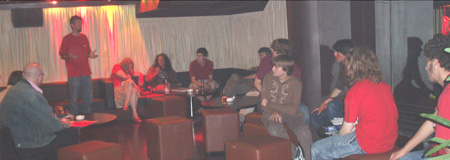Hands Off Venezuela at the Manchester anti-war demonstration
- 26 September 2006
Hands off Venezuela supporters
joined the anti-war movement in Manchester on Saturday, September 23.
Along with thousands of people we marched and denounced the imperialist
wars that the British government is waging in Iraq and Afghanistan,
demanding the immediate end to the occupation of these countries and
the withdrawal of British troops from them.
The march, which was called
by the Stop the War Coalition, took place on the eve of the Labour Party
conference and was, in fact, a massive message of rejection of Blair
and Blairism, not only of his foreign policy but also of his social
and economic policies in Britain.
 Hands off Venezuela ran a very
successful stall in Albert Square and also organised a meeting in which
the latest developments in the revolutionary processes in Venezuela
and Mexico were discussed and put into context. The stall attracted
a lot of interest and we sold out of copies of the new Hands Off Venezuela
magazine. It was noticeable that quite a lot of people had heard Chavez's
speech at the United Nations. Also a few of the demonstrators from Arab
countries explained that Chavez has become extremely popular in the
Arab world, since he is seen as someone who stands up to the power of
US imperialism, unlike the leaders of the Arab world.
Hands off Venezuela ran a very
successful stall in Albert Square and also organised a meeting in which
the latest developments in the revolutionary processes in Venezuela
and Mexico were discussed and put into context. The stall attracted
a lot of interest and we sold out of copies of the new Hands Off Venezuela
magazine. It was noticeable that quite a lot of people had heard Chavez's
speech at the United Nations. Also a few of the demonstrators from Arab
countries explained that Chavez has become extremely popular in the
Arab world, since he is seen as someone who stands up to the power of
US imperialism, unlike the leaders of the Arab world.
Jorge Martin, International
Secretary of the Campaign, addressed an overwhelmingly young group of
around 35 people, which, given the fact the many people had come from
outside Manchester and that the march was delayed, was more than a respectable
number.
Jorge began his speech by offering
a brief, accurate and up to date summary of the Venezuelan revolutionary
process, and later went in to a more in depth analysis of the current
situation and the dangers that the revolution faces.
"In my opinion," he said,
"unless the revolutionary movement moves towards the expropriation
of the landlords, banks and big monopolies the revolution is and will
be in danger of being defeated at any time. Venezuela not only faces
the threat of imperialist intervention from outside its borders but
also from within. The oligarchy in Venezuela, which still pulls the
strings of the economy through their control of banks, media and big
monopolies, are the agents of imperialism in Venezuela. They have tried
to overthrow the democratically elected government of President Chavez
through violence and sabotage, practices that they still pursue and
advocate, and no doubt they will try again as soon as they see a favourable
situation for them."
"Also, as Chavez himself has recognised, another important threat that the revolution faces is corruption and bureaucratism." He mentioned how president Chavez, in a recent interview to Panorama, referred to this: "The main threat is within. There is a constant bureaucratic counter-revolution. I am an enemy on a daily basis. I have to walk around with a whip, because I am being attacked from all sides by this enemy, the old bureaucracy and a new one which resists changes. So much so that I have to be constantly en guard when I give an instruction, and follow it up so that it is not stopped, or diverted, or minimised by this bureaucratic counter-revolution which exists within the state. This would be one of the elements of the new phase that we are entering in: the transformation of the State."
Jorge then moved on to discuss
Mexico and explained the struggle of millions of people against the
rigging of the presidential elections, reminding all those present that
Chávez's government had not yet recognised Felipe Calderón as president
of Mexico.
"In Oaxaca," he said, "a
teachers strike for better conditions and wages has become, in the process
of struggle against the forces of repression, an insurrectionary movement
that has wrested from the state functions such as security, policing,
transport, food distribution, etc. This has created a situation in which
the APPO (Popular Assembly of the People of Oaxaca), which is actually
running the city as the only legitimate organ of power, has banned the
governor from entering the city and has occupied private means of communications,
radio and TV stations, to break the information blackout that the private
media had imposed on their struggle.
"These struggles in Oaxaca
are already having important consequences in the United States, for
instance, when the university radio station that the movement was using
to broadcast their messages was destroyed with sulphuric acid by an
infiltrated agent, a call for help was issued and in just a couple of
days more than $200,000 were raised amongst Mexican workers immigrants
in the USA".
 Jorge then highlighted that
these struggles are not just taking place in a distant country in Latin
America but that, essentially, people in Mexico, Venezuela or Bolivia
are fighting against the same policies that we in Europe are fighting
against - against privatisation, attacks on working conditions and workers'
rights, attacks on pensions, state education and the health services.
Jorge then highlighted that
these struggles are not just taking place in a distant country in Latin
America but that, essentially, people in Mexico, Venezuela or Bolivia
are fighting against the same policies that we in Europe are fighting
against - against privatisation, attacks on working conditions and workers'
rights, attacks on pensions, state education and the health services.
He finished his intervention and opened the floor for contributions and questions by referring again to president Chávez, who in 2006 at the World Social Forum in Caracas, insisted that, "we are not here to waste time, we are talking about saving life on the planet, we are talking about saving the human species, changing the course of history, changing the world", and stressed the need to build "a grand worldwide anti-imperialist, alternative movement, that will engage the entire world and that has the capacity to connect, grow, and fight." Taking up Chavez's call, Jorge explained that "the best solidarity we can show the Bolivarian Revolution is to join the revolutionary struggle everywhere".

 Please help build the campaign by
Please help build the campaign by